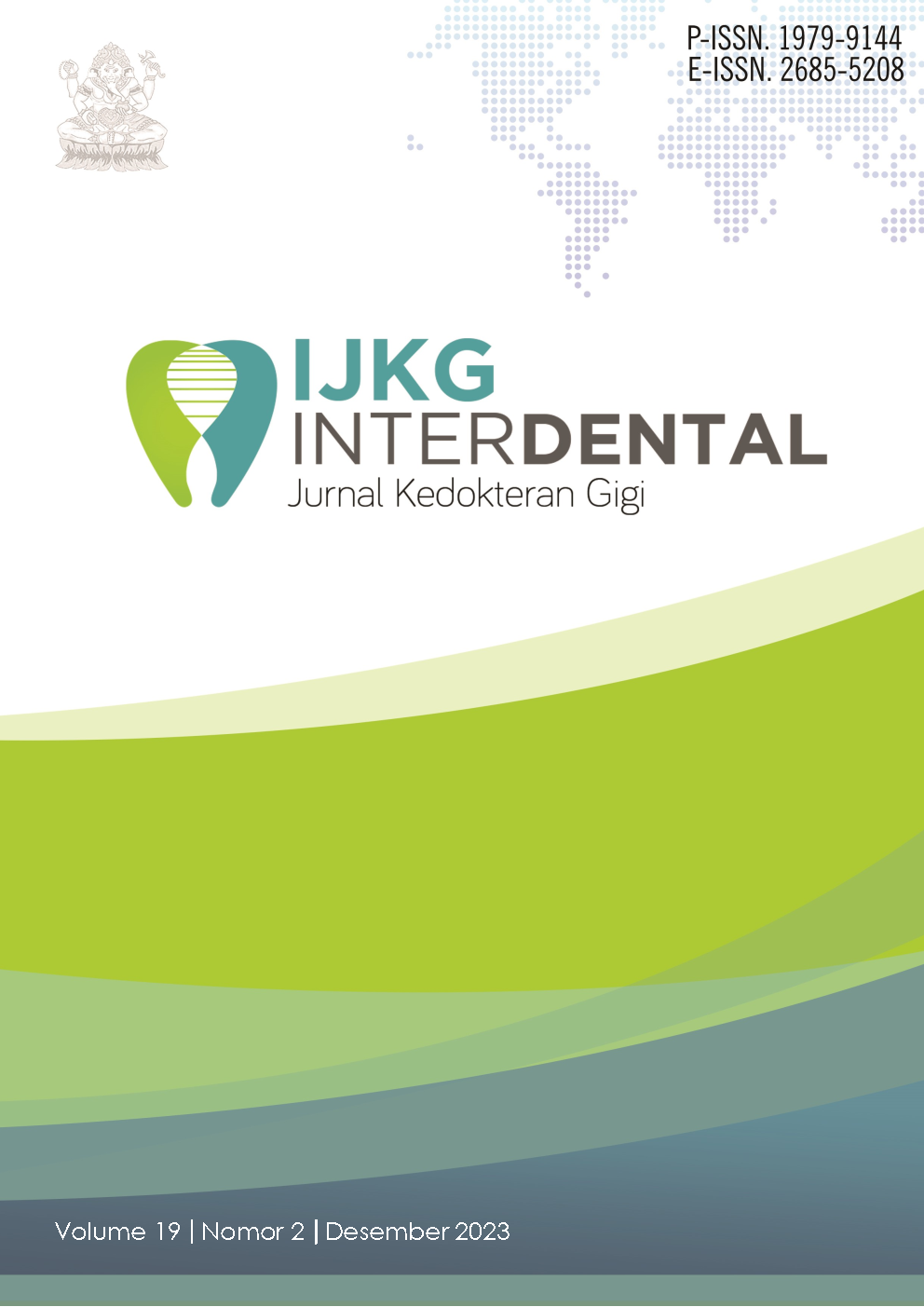CASE MANAGEMENT OF ANTERIOR TOOTH INTRUSION DUE TO TRAUMA
DOI:
https://doi.org/10.46862/interdental.v19i2.7723Keywords:
Anterior teeth, intrusion, luxation, traumaAbstract
Introduction: Dental trauma is damage that affects the hard tissue of the teeth and/or periodontal due to mechanical causes. One of the effects of trauma to the teeth is intrusive luxation, namely the movement of teeth into the alveolar bone, which can cause damage or fracture of the alveolar socket. Intrusive luxation causes the tooth crown to appear shorter.
Case: An 11 year old male patient who was involved in a traffic accident came to the emergency department with complaints of being unable to walk, swollen lips and broken teeth.
Case Management: The patient experienced intrusive luxation on tooth 21 and subluxation on teeth 11 and 22. The treatment carried out in this case was repositioning of tooth 21. Then splinting was carried out using wire on teeth 12, 11, 21, 22 for 1 month.
Discussion: Immediate repositioning of luxated teeth is very important to accelerate tissue healing. Treatment in acute cases can be supplemented with acute management, namely administering antibiotics. In this case, antibiotics, anti-inflammatories and calcium are given to speed up tissue healing and reduce the risk of complications in the tissue.
Conclusions and Suggestions: immediate repositioning, accompanied by wire splints and administration of antibiotics provide good results in the treatment of cases of intrusive luxation due to accidental trauma.
Downloads
References
Andersson L. Epidemiology of traumatic dental injuries. J Endod 2013; 39(3 Supply):S2-5. doi: https://doi.org/10.1016/j.joen.2012.11.021
Maloney K. Circummandibular Wires for Treatment of Dentoalveolar Fractures Adjacent to Edentulous Areas: A Report of Two Cases. Craniomaxillofac Trauma Reconstr 2015;8(3):246–250. doi: https://doi.org/10.1055%2Fs-0034-1399801
Cameron AC, Widmer RP. Handbook of pediatric dentistry. 2nd edition. Philadelphia: Mosby; 2003.
Dighe K, Kakade A, Takate V, Makane S, Padawe D, Pathak R. Prevalence of Traumatic Injuries to Anterior Teeth in 9–14 Year School-going Children in Mumbai, India. J Contemp Dent Pract. 2019;20(5):622–30.
Magno MB, Nadelman P, Leite KL de F, Ferreira DM, Pithon MM, Maia LC. Associations and risk factors for dental trauma: A systematic review of systematic reviews. Community Dent Oral Epidemiol. 2020;48(6). doi: https://doi.org/10.1111/cdoe.12574
Pagadala S, Tadikonda DC. An overview of classification of dental Trauma. Int Achieved Integr Med (IAIM Journal). 2015;2(9): 157-64.
Souza BDM de, Dutra KL, Reyes-Carmona J, Bortoluzzi EA, Kuntze MM, Teixeira CS, et al. Incidence of root resorption after concussion, subluxation, lateral luxation, intrusion, and extrusion: a systematic review. Clin Investig. 2020;24(3):1101–11. doi: https://doi.org/10.1007/s00784-020-03199-3
Khandelwal P, Srinivasan S, Arul B, Natanasabapathy V. Fragment reattachment after complicated crown-root fractures of anterior teeth: A systematic review. Dent Traumatol. 2020;36(4):37-52. doi: https://doi.org/10.1111/edt.12602
Bassetti MA, Mischler DC, Kuttenberger JJ, Bassetti RG. Spontaneous reeruption after intrusive luxation of the permanent incisors by incomplete root formation. Two case reports (in German). Swiss Dent J. 2019;129(9):709–17.
Riyanti E. PENATALAKSANAAN TRAUMA GIGI PADA ANAK. Bandung: Universitas Padjadjaran; 2015.
Bourguignon C, Cohenca N, Lauridsen E, et al.. International association of dental Traumatology guidelines for the management of traumatic dental injuries: 1. fractures and luxations of permanent teeth. Dent Traumatol. 2020;36(4): 314-330. doi: https://doi.org/10.1111/edt.12578
Andreasen JO, Andreasen FM, Andersson L. Text book and color atlas of traumatic injuries to the teeth. 4th ed. Copenhagen: Blackwell; 2007.
Humphrey J, Kenny DJ, Barrett EJ. Clinical outcomes for permanent incisor luxation in a paediatric population I. intrusion. Dent Traumatol. 2003; 19(5):266-73. doi: https://doi.org/10.1034/j.1600-9657.2003.00207.x
Albadri S, Zaitoun H, Kinirons MJ, et al. UK national clinical guidelines in paediatric dentistry: treatment of traumatically intruded permanent incisor teeth in children. Int J Paediatr Dent. 2010;20(Supply 1): 1-2. doi: https://doi.org/10.1111/j.1365-263x.2010.01085.x
Goormans F, Coropciuc R, Vercryusse M, et al. Systemic Antibiotic Prophylaxis in Maxillofacial Trauma: A Scoping Review and Critical Appraisal. Antibiotics. 2022;11(4): 483. doi: https://doi.org/10.3390/antibiotics11040483
Helsloot D, Fitzgerald M, Lefering R, Verelst S, Missant C. Trauma‑induced disturbances in ionized calcium levels correlate parabolically with coagulopathy, transfusion, and mortality: a multicentre cohort analysis from the TraumaRegister DGU. Crit Care. 2023;27(267):1-12. doi: https://doi.org/10.1186/s13054-023-04541-3
Downloads
Published
How to Cite
Issue
Section
License
Copyright (c) 2023 Aryo Sutowijoyo, Prima Nerito

This work is licensed under a Creative Commons Attribution-ShareAlike 4.0 International License.
- Every manuscript submitted to must observe the policy and terms set by the Interdental Jurnal Kedokteran Gigi (IJKG)
- Publication rights to manuscript content published by the Interdental Jurnal Kedokteran Gigi (IJKG) is owned by the journal with the consent and approval of the author(s) concerned.
- Full texts of electronically published manuscripts can be accessed free of charge and used according to the license shown below.













